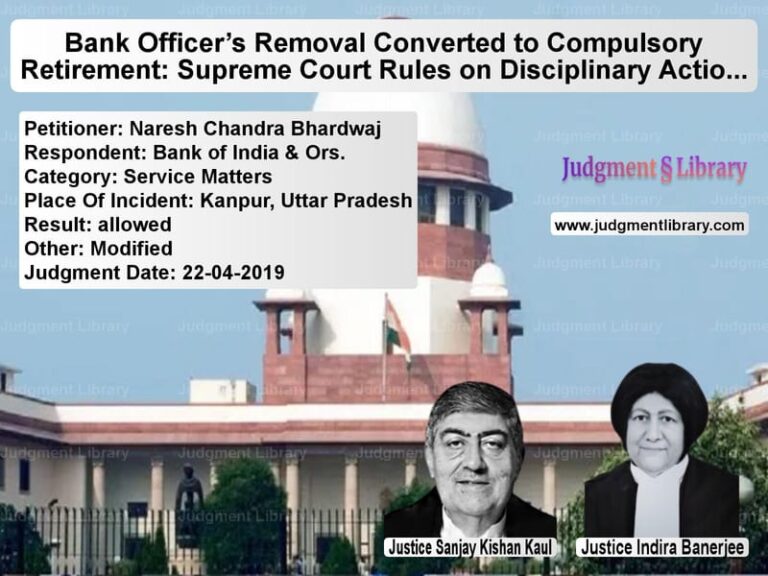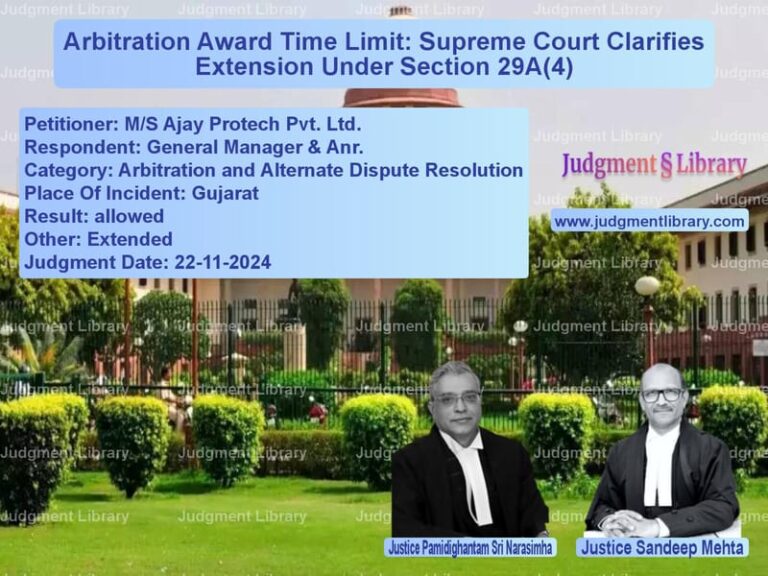Supreme Court Restores Trial Court’s Partition Ruling in Family Property Dispute
The Supreme Court of India, in Chamayath Cheriyannal (D) Th LRs & Another vs. Chamayath Cheriyannal Hajirommabi & Others, ruled on a long-standing family partition dispute. The case involved members of a Tarwad (a traditional matrilineal family unit in Kerala) and the legality of a partition among different branches of the family. The Supreme Court upheld the findings of the Trial Court and set aside the High Court’s ruling, thereby restoring the original partition arrangement.
Background of the Case
The dispute concerned two separate branches of the Tarwad, namely the Attakoya Thavazhy and the Syed Koya Thavazhy. A partition had been effected among the members of the Tarwad, and a share from one branch had been gifted. The central issue was whether a member from one branch could object to the gifting of property belonging to another branch.
The Trial Court ruled in favor of the appellants, affirming the legitimacy of the partition and the gift transaction. However, the High Court overturned this decision, leading the appellants to seek relief from the Supreme Court.
Petitioner’s (Chamayath Cheriyannal & Another) Arguments:
- The appellants argued that the partition was validly executed and that the Trial Court had correctly recognized the division among the two branches.
- They contended that once the partition was carried out, members of one Thavazhy (branch) could not challenge property dealings within another Thavazhy.
- They sought restoration of the Trial Court’s ruling, arguing that the High Court wrongly interfered with well-established findings.
Respondent’s (Chamayath Cheriyannal Hajirommabi & Others) Arguments:
- The respondents argued that the partition was flawed and that they had the right to challenge the gift of property made by one branch of the Tarwad.
- They contended that the partition was not absolute and that all members of the extended family had a stake in the property transactions.
- The respondents sought validation of the High Court’s decision, which had ruled in their favor.
Supreme Court’s Judgment:
- The Supreme Court upheld the Trial Court’s findings and ruled that the High Court should not have interfered in the matter.
- The judgment stated, “Once there was a partition among the members of the Tarwad, and when there are two different Thavazhy, namely Attakoya Thavazhy and Syed Koya Thavazhy, and when some share of one Thavazhy had been gifted, the same could not have been objected to by a member of another Thavazhy.”
- The Court ruled that the partition was legally binding and that one branch could not interfere in the property dealings of another branch.
- It set aside the High Court’s ruling and restored the order and decree passed by the Trial Court.
Key Takeaways
- The judgment reinforces the principle that once a partition is executed, it is final and binding on all members involved.
- Members of one branch of a Tarwad cannot interfere with the property transactions of another branch.
- The ruling underscores the Supreme Court’s stance against unnecessary judicial interference when Trial Court findings are well-founded.
The judgment was delivered by Justice Anil R. Dave and Justice Adarsh Kumar Goel on February 4, 2016.
This decision provides clarity on family partition laws and reinforces the finality of partition agreements once they are lawfully executed.
Don’t miss out on the full details! Download the complete judgment in PDF format below and gain valuable insights instantly!
Download Judgment: Chamayath Cheriyanna vs Chamayath Cheriyanna Supreme Court of India Judgment Dated 04-02-2016-1741852891447.pdf
Direct Downlaod Judgment: Direct downlaod this Judgment
See all petitions in Property Disputes
See all petitions in Succession and Wills
See all petitions in Landlord-Tenant Disputes
See all petitions in Judgment by Anil R. Dave
See all petitions in Judgment by Adarsh Kumar Goel
See all petitions in allowed
See all petitions in supreme court of India judgments February 2016
See all petitions in 2016 judgments
See all posts in Civil Cases Category
See all allowed petitions in Civil Cases Category
See all Dismissed petitions in Civil Cases Category
See all partially allowed petitions in Civil Cases Category







